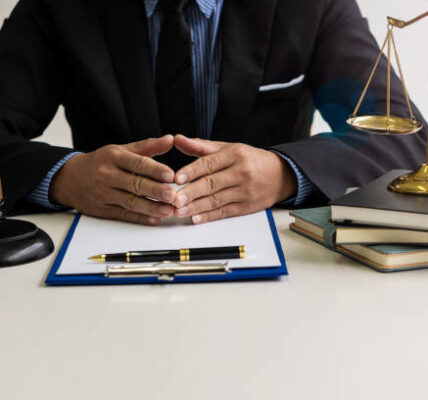Introduction:
In the realm of criminal law, where the stakes are high and the consequences severe, the role of a criminal defense lawyer is paramount. These legal professionals are adept at navigating the intricate web of laws, procedures, and evidence to mount a robust defense on behalf of their clients. In this article, we delve into the strategies employed by criminal defense lawyers to safeguard the rights and interests of those facing criminal charges.
Understanding Defense Strategies:
Criminal defense lawyers utilize a variety of strategies to defend their clients against criminal charges. These strategies are tailored to the specific circumstances of each case and are designed to challenge the prosecution’s evidence, cast doubt on their case, and secure the best possible outcome for the defendant. Here are some common defense strategies:
Presumption of Innocence:
Central to the defense’s strategy is the presumption of innocence, a fundamental principle of criminal law. Criminal defense lawyers emphasize that the burden of proof rests with the prosecution to prove the defendant’s guilt beyond a reasonable doubt. They highlight inconsistencies in the prosecution’s case and exploit any weaknesses in the evidence presented.
Challenging Evidence:
Criminal defense lawyers meticulously examine the evidence against their clients, looking for weaknesses, inconsistencies, or violations of legal procedures. They may challenge the admissibility of evidence obtained through illegal searches or seizures, unreliable witness testimony, or forensic evidence that lacks credibility. By undermining the prosecution’s evidence, they weaken their case and create doubt in the minds of jurors.
Affirmative Defenses:
In some cases, criminal defense lawyers may assert affirmative defenses, which acknowledge the defendant’s actions but seek to justify or excuse them under the law. Common affirmative defenses include self-defense, necessity, duress, insanity, intoxication, and entrapment. By presenting evidence to support these defenses, lawyers seek to demonstrate that their clients’ actions were justified or mitigated under the circumstances.
Negotiating Plea Bargains:
Criminal defense lawyers often engage in plea negotiations with prosecutors to secure favorable outcomes for their clients. They may negotiate reduced charges, lenient sentencing recommendations, or alternative sentencing options in exchange for guilty pleas. Plea bargaining can result in lighter penalties and avoid the uncertainty and expense of a trial for both parties.
Jury Selection and Trial Strategy:
During jury selection, criminal defense lawyers carefully vet potential jurors to identify biases, prejudices, or predispositions that may affect their ability to render a fair and impartial verdict. They develop trial strategies tailored to the specific jury panel, presenting persuasive arguments, cross-examining witnesses, and delivering compelling closing statements to sway the jury in favor of their clients.
FAQs About Criminal Defense Strategies and Lawyers
Q: What is the role of a criminal defense lawyer?
A: A criminal defense lawyer is a legal professional who specializes in defending individuals accused of criminal offenses. Their role is to provide legal representation and advocacy for their clients throughout the criminal justice process, ensuring that their rights are protected and that they receive a fair trial.
Q: What types of cases do criminal defense lawyers handle?
A: Criminal defense lawyers handle a wide range of cases, including misdemeanors, felonies, white-collar crimes, drug offenses, DUI/DWI charges, assault and battery, theft and property crimes, domestic violence, and more. They defend clients facing criminal charges at every stage of the legal proceedings, from investigations to trial and appeals.
Q: What are some common defense strategies used by criminal defense lawyers?
A: Criminal defense lawyers use a variety of strategies to defend their clients against criminal charges, including challenging evidence, asserting affirmative defenses, negotiating plea bargains, selecting juries, and presenting persuasive arguments at trial. These strategies are tailored to the specific circumstances of each case and are designed to secure the best possible outcome for the defendant.
Q: How do criminal defense lawyers challenge evidence presented by the prosecution?
A: Criminal defense lawyers challenge evidence presented by the prosecution by meticulously examining its reliability, credibility, and admissibility. They may challenge evidence obtained through illegal searches or seizures, unreliable witness testimony, or forensic evidence that lacks credibility. By undermining the prosecution’s evidence, they weaken their case and create doubt in the minds of jurors.
Q: What is an affirmative defense, and how do criminal defense lawyers use it?
A: An affirmative defense is a legal argument that acknowledges the defendant’s actions but seeks to justify or excuse them under the law. Common affirmative defenses include self-defense, necessity, duress, insanity, intoxication, and entrapment. Criminal defense lawyers present evidence to support these defenses, demonstrating that their clients’ actions were justified or mitigated under the circumstances.
Q: How do criminal defense lawyers negotiate plea bargains with prosecutors?
A: Criminal defense lawyers negotiate plea bargains with prosecutors by presenting mitigating factors, weaknesses in the prosecution’s case, or alternative sentencing options that benefit their clients. They may negotiate reduced charges, lenient sentencing recommendations, or alternative sentencing options in exchange for guilty pleas, thereby securing favorable outcomes for their clients.
Q: What is the importance of jury selection in criminal defense cases?
A: Jury selection is crucial in criminal defense cases because it allows defense lawyers to identify potential biases, prejudices, or predispositions among potential jurors that may affect their ability to render a fair and impartial verdict. Defense lawyers carefully vet potential jurors to select those who are most likely to be sympathetic to their client’s case and present persuasive arguments at trial.
Q: How can I find a reputable criminal defense lawyer to represent me?
A: You can find a reputable criminal defense lawyer by asking for referrals from friends, family members, or trusted professionals, researching online reviews and ratings, contacting your local bar association for recommendations, and scheduling consultations with multiple lawyers to discuss your case and assess their qualifications.
Q: What should I expect during my initial consultation with a criminal defense lawyer?
A: During your initial consultation with a criminal defense lawyer, you can expect to discuss the details of your case, including the charges you’re facing, any evidence or witnesses involved, your legal rights and options, and the lawyer’s approach to handling your case. It’s an opportunity to ask questions, clarify concerns, and determine whether the lawyer is the right fit for you.
Q: How can a criminal defense lawyer help me if I’m accused of a crime?
A: A criminal defense lawyer can help you if you’re accused of a crime by providing expert legal representation and advocacy throughout the criminal justice process. They protect your rights, challenge the prosecution’s evidence, negotiate plea bargains, defend you in court, and ensure that you receive a fair trial. Their goal is to secure the best possible outcome for you, whether it’s an acquittal, reduced charges, or a favorable plea agreement.
Conclusion:
Criminal defense lawyers are skilled advocates who employ a variety of strategies to protect the rights and interests of their clients in criminal proceedings. From challenging evidence and asserting affirmative defenses to negotiating plea bargains and presenting compelling arguments at trial, these legal professionals are dedicated to securing the best possible outcome for those facing criminal charges. If you or someone you know is accused of a crime, don’t hesitate to seek the assistance of a qualified criminal defense lawyer who can provide expert legal representation and guidance throughout the legal process.


